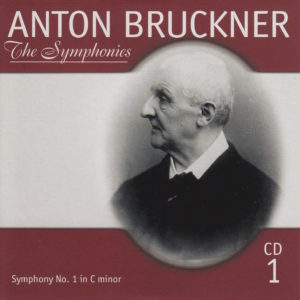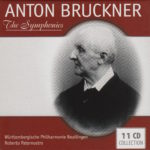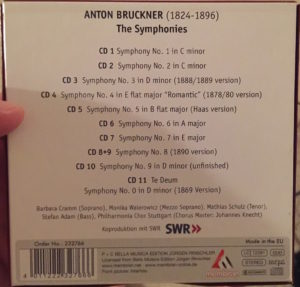 This morning’s conductor of Anton Bruckner’s Symphony No. 1 in C Minor (WAB 101) is Vienna-born Roberto Paternostro (1957?-), another person about whom I knew nothing and had never even heard of until I started this project.
This morning’s conductor of Anton Bruckner’s Symphony No. 1 in C Minor (WAB 101) is Vienna-born Roberto Paternostro (1957?-), another person about whom I knew nothing and had never even heard of until I started this project.
Given how little there is about him online – including a compelling biography that includes (at the very least) his date of birth – I’m going to go out on a limb and say he’s not ever going to be well known until he at least has an English-language entry on Wikipedia. I do believe there is a Wiki entry for him, but it’s in German. So I can only guess that his date of birth is 1957. Very little else (in fact, nothing else) on that page is decipherable, at least to me.
Paternostro needs a publicist in the worst way.
He has an official web site that includes a bio. But no date of birth there, either. However, there is a lengthy bio (in English) – albeit a rather dry one that’s not much more that a recitation of performances and CDs.
The opening paragraph caught my eye, though:
Roberto Paternostro was born in Vienna where he studied at the Music University under Hans Swarowsky. Further studies under György Ligeti and Christoph von Dohnányi in Hamburg. 1978 to 1984 he was assistant of Herbert von Karajan in Berlin.
 Working with Herbert von Karajan is a lovely credential to cite, especially since Karajan was considered by many to be the superstar conductor of the 20th century. So I can see why Paternostro would want that information in the first paragraph of his biography.
Working with Herbert von Karajan is a lovely credential to cite, especially since Karajan was considered by many to be the superstar conductor of the 20th century. So I can see why Paternostro would want that information in the first paragraph of his biography.
As for this box set…sigh. There’s very little information here to tell me what I’m listening to.
Here’s what I do know:
Anton Bruckner
Symphony No. 1 in C Minor
Conducted by Roberto Paternostro
Orchestra is Wurttembergische Philharmonie Reutlingen (web site in German)
Recorded in October of 2004
Recorded in Basilika Weingarten (Wiki page in German)
The running time for each movement
Membran record label
 That’s it.
That’s it.
See for yourself. These are all the details I have about the music therein.
To make matters worse, there’s no CD booklet; hence, no liner notes. No bio on Paternostro. No info on Bruckner and his symphonies. No description of the orchestra used for Bruckner’s First Symphony.
The information in this box set doesn’t even include which version of Bruckner’s Symphony No. 1 in C Minor Paternostro is using – Linz? Or Vienna? That omission is inexcusable.
Less information in a box set I don’t think I’ve seen so far.
True, this is a budget-priced set. I paid only about $16 for it on Amazon. Still, how much more time and effort – and cost – would it have taken to include at least the version of the symphony?
First, the objective information:
Bruckner wrote his symphonies in four parts. The breakdown of this one (using the unknown version), from this particular conductor (Paternostro) and this particular orchestra (Wurttembergische Philharmonie Reutlingen), is as follows:
Allegro…………..13:23
Adagio……………15:03
Scherzo……………9:32
Finale……………..16:17
To save time (let’s call this my “budget-priced” review), I’m only going to compare this performance to one from one of my favorite conductors so far: Jochum.
The breakdown from the Jochum interpretation (which uses the Linz version) I listened to 9 October 2016 – performed by Staatskapelle Dresden – was:
Allegro…………..12:29
Adagio……………12:38
Scherzo……………9:02
Finale……………..12:57
This indicates the Paternostro interpretation of Bruckner’s Symphony No. 1 in C Minor is over six minutes longer than the one conducted by Eugen Jochum. The much longer time comes from a lengthened Allegro (Movement I), a much-longer Adagio (Movement II), and a much, much longer Finale (Movement IV).
Now, here are the subjective aspects:
My Rating:
Recording quality: 3 (not quite as much depth, complexity, and power as other recordings I’ve heard to date)
Overall musicianship: 3
CD liner notes: 0 (no liner notes!)
How does this make me feel: 2
This is an okay performance. Nothing outstanding. It’s big in parts, quiet in others. It’s Classical music, all right. But it doesn’t move me.
The best demonstration of this lack of the Wow Factor can be heard in the anemic clapping at the end of the Finale. It’s almost embarrassing. The music ends at 15:07. A few people start clapping at 15:16. Think about that. For nearly 10 full seconds, there’s silence. When people do start clapping, it’s so lackluster that it takes another few seconds for others to chime in. The sleepy clapping lasts for nearly a minute.
Obviously, the orchestra could also use a publicist.
Maybe the venue (Basilika Weingarten) needs one, too.
And how about the record label on which this is recorded? It can’t find anything about them.
Hell, let’s just say they all need a publicist.
Who are all these people?
